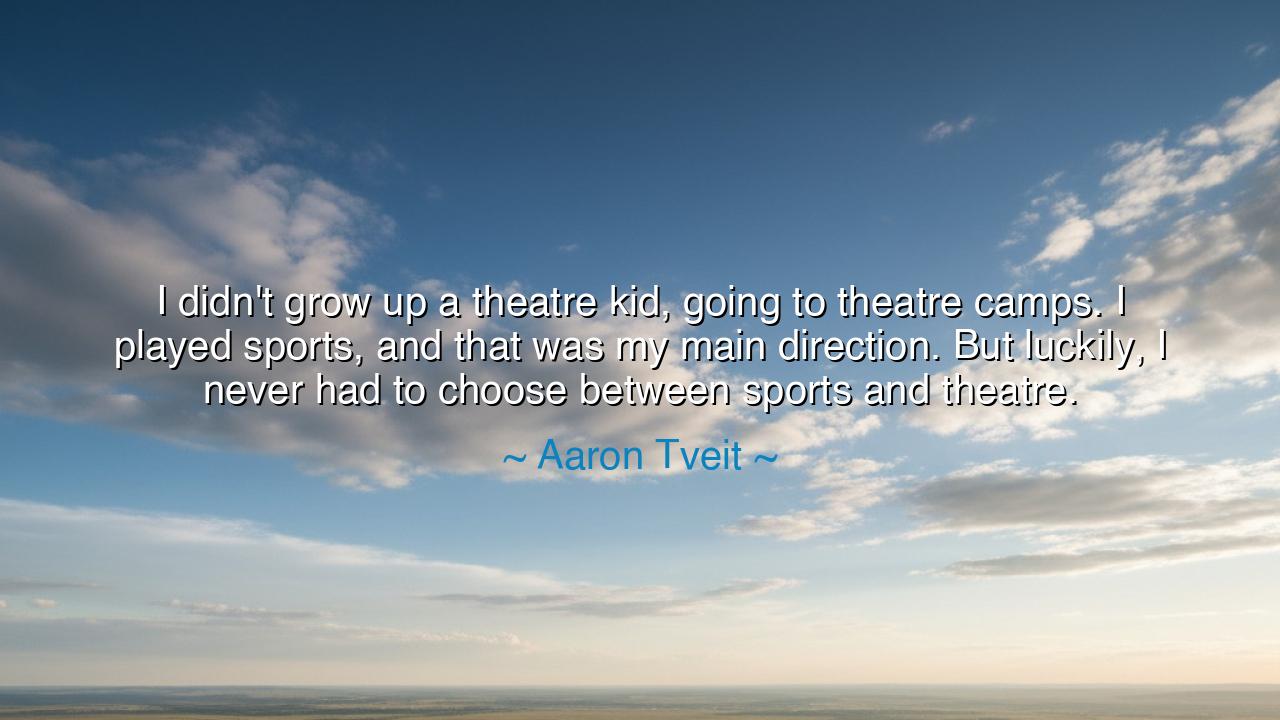
I didn't grow up a theatre kid, going to theatre camps. I played
I didn't grow up a theatre kid, going to theatre camps. I played sports, and that was my main direction. But luckily, I never had to choose between sports and theatre.






The words of Aaron Tveit, “I didn’t grow up a theatre kid, going to theatre camps. I played sports, and that was my main direction. But luckily, I never had to choose between sports and theatre,” are a testimony to the harmony of diverse talents, and to the truth that the human spirit is not bound to a single road. In his confession, there is both humility and wonder: humility, because he admits he was not raised in the familiar traditions of the stage; wonder, because life opened a door that allowed him to embrace both strength of body and artistry of soul.
The origin of this thought lies in Tveit’s youth, shaped not by stages and scripts, but by the training fields where competition and discipline reigned. In that world, his identity was not that of the performer, but of the athlete, his main “direction.” Yet destiny, like a river, often bends in ways we cannot foresee. He discovered theatre, not as a replacement but as a companion to sport, and in that union found his calling. His words remind us that sometimes we are not forced to abandon one path for another; instead, we are granted the grace to carry both within us, shaping a richer and more complete self.
History too knows this truth. Alexander the Great, though remembered as a conqueror, was also trained in philosophy under Aristotle, uniting the disciplines of war and wisdom. Had he been only a warrior, his legacy would have been blood alone; had he been only a thinker, his name might never have spread. But by holding both together, his life gained a breadth that neither alone could give. Likewise, Tveit’s union of sports and theatre mirrors the ancient belief that a full human being is one who trains both body and soul.
We may also look to the story of Paul Robeson, the great American actor, singer, and activist. Before he was acclaimed for his artistry, he was a star athlete at Rutgers, excelling in football and other sports. He too embodied this truth: that the strength of the body and the power of expression can exist side by side. Robeson’s life, like Tveit’s words, stands as a witness that no one should be confined to a single box or identity, for the human spirit is vast.
The lesson in this is one of liberation: do not believe that you must choose between your passions. The world will often press you to declare a single path, to forsake one love for another, to narrow yourself into one identity. But the truth is richer: you are not a creature of one talent, but of many. If your heart loves more than one thing, pursue them both, for they may one day converge, and in that convergence you may find a destiny more radiant than you imagined.
Practically, this means giving yourself permission to explore. If you are drawn to music but also to science, walk both roads. If you love athletics but also long for poetry, practice both. Let no voice tell you that one cancels the other. Instead, see them as streams that feed the same river of your life. You may not yet know how they will join, but in time, you will see that nothing is wasted, and every passion enriches the whole.
So, beloved listener, let Aaron Tveit’s words be a beacon: sports and theatre, strength and artistry, discipline and imagination—none are enemies. They are companions, and together they form the fullness of the human journey. Do not narrow yourself, but expand. Embrace the many threads of your being, and weave them into a tapestry that is wholly your own. For in the end, greatness belongs not to those who choose only one road, but to those who dare to walk with both body and soul alive, united in the pursuit of all that makes us truly human.






AAdministratorAdministrator
Welcome, honored guests. Please leave a comment, we will respond soon